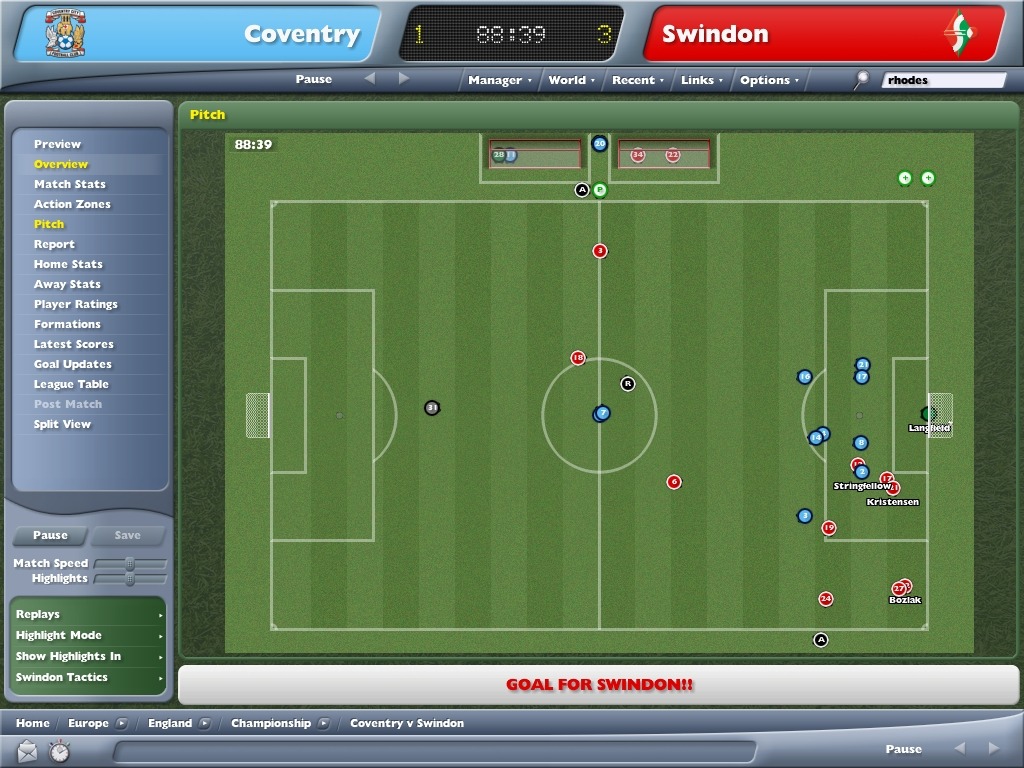
Football Manager 2006
Written by: Rik
Date posted: May 24, 2015
- Genre: Sport
- Developed by: Sports Interactive
- Published by: Sega
- Year released: 2005
- Our score: 9
Perhaps the only good thing to come out of choosing to cover Championship Manager Quiz was that it reminded me of Championship Manager itself. It’s getting on for 10 years since we had a look at the 00-01 incarnation, at which point the transition to the name Football Manager – made necessary by a split with publisher Eidos, who retained rights to the CM brand – was in its early stages. Since that review, I’d not revisited either series, and my own knowledge of their respective merits went little beyond an awareness that I should probably buy FM, not CM, in future, should I wish to rekindle an interest in virtual football management.
One hesitates before doing such a thing, though, for a new game of Football Manager is not to be taken lightly, especially for anyone with work and other commitments that may or not include playing other games. Another question is what level of insight any write-up would offer. Much of what was said last time could also apply here: the series hasn’t ever been subject to radical and sweeping changes, although obviously there are new features and additions each year. Listing and highlighting such things isn’t particularly enlightening, as contemporary reviews of each annual update have found at the time, especially as the time pressures of review deadlines don’t often allow sufficient opportunity to provide a fully-formed opinion.
Whatever changes have taken place over the years, they’ve definitely increased the time demands on the player – in terms of real time versus game time – and despite sinking 135 hours into FM 2006, I completed a mere 5 seasons. Many, of course, do manage to play for years and years – until their virtual manager reaches retirement age – or complete multiple games with a variety of clubs. So perhaps I don’t have the widest experience of the FM world, either. On the other hand, I kind of felt a bit odd that I’d not played any incarnation of one of my favourite ever games for the best part of a decade, and since that’s what FFG is, after all, supposed to be about, I decided to follow my urges and set aside some time to give it another go.
Despite having said what I’ve just said about listing features, we do need to make a bit of a note of what’s changed since we last looked at the series. Perhaps the most significant is the inclusion of on-pitch action, a feature the series famously eschewed until the developers felt it could be done right – which didn’t stop a great many other management titles in the meantime erroneously claiming that their own flimsy pitch highlights gave them the edge. The option to view matches was the big selling point of Championship Manager 4, the penultimate CM release developed by SI, although when this breakthrough came it was in the cosmetically unexciting format of a basic top down pitch view, with players represented by coloured dots. This remained in place throughout the first few editions of Football Manager – including FM 2006 – until 3D matches were finally added in FM 2009.
So watching a full match is possible, although not entirely necessary, and extended highlights, along with the same stats and figures you previously had to guide you, are more than sufficient. Like all the best new features, the highlights do actually add something – whether it’s pinpointing why you’re struggling to retain possession, or noticing that your ageing fullback isn’t able to deal with a tricky winger (hopefully in advance of sustaining scoreline damage) – and it’s just another way the game gives you feedback on how things are going. This has always been the argument regarding match highlights – anyone can staple on a few generic animations of players making a tackle, or scoring a goal, but apart from being superficially impressive, they ultimately add nothing.
There’s no other single addition that’s quite as significant as this and elsewhere, it’s largely a case of incremental changes, and while they do all add up, it’s not particularly easy, or – as we mentioned – all that interesting, to try and list them all. (Once upon a time, more significant overhauls would be differentiated from seasonal updates by actually being named as sequels – CM3 was a big step up from CM2, for example, whereas CM 00-01 was only a refined and improved version of CM3 and any previous updates – but this is no longer the case). Seeing as I haven’t actually played any CM/FM since 00-01, it seems reasonable enough, if slightly lazy, to just mention the ones that happened to stand out to me as I played.
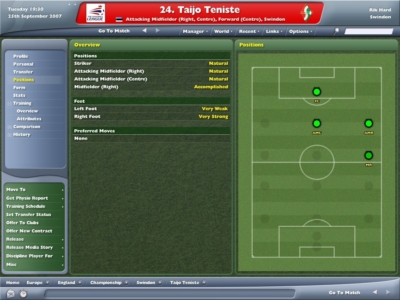
Versatile players may be stronger in some positions than others. Sadly,
Taijo Teniste wasn’t much good wherever I played him. Enjoy life at Northampton Town, pal.
Ability masking – ie not being able to see the full set of statistics for an opposition player until your scouts have seen him in action – is an obvious one, although that was first introduced in the final CM3 update, 01-02. Annoying as it might be at first, it’s a change that makes sense, and it does mean that, more than ever, following a hunch could land you with someone who’s not good enough. You can also now negotiate your budget with the board – balancing transfer funds against wage bill limit, as well as your own managerial contract, although the latter seems a bit pointless, given that it’s not real money, and your own earnings don’t really seem to factor into anything significant within the game. I guess they could have a bearing on your manager stats, another new addition, but while it is interesting to see how the game interprets your actions, they, too, don’t seem to have massive operational importance. Managing the fitness of players – especially with a big squad – also seems tougher, and you now have more feedback about players’ preferred positions that can have you agonising over how to get the most out of your more versatile squad members.
The interface has undergone an overhaul, and to my mind it’s now a bit clumsy in places, but it’s one of those things that seems more significant at the start of your first new game than it actually is, especially if you haven’t played for a while, as it gets rolled into a general anxiety that the game will now be too complicated for you to comprehend. Ultimately, I tend to find that each edition has more in common with its predecessors than might initially be apparent.
The one big change I expected to have to deal with was the increased media interaction, which in my (admittedly failing) memory was a much-trumpeted addition to successive FM titles. It’s possible that this was all a lot later than FM 2006, as the majority of what it entails here – beyond the usual dealing with unhappy or disruptive players – is the ability to comment on other managers and teams before and after a game. Offering praise or flattery could be seen as taking pressure off your team by putting the spotlight on the opposition, but some players in your squad may question why you are complimenting opponents. Equally, you can go on the offensive and start slagging other managers off, but while this might galvanise your squad it also puts them under pressure to back up your words with actions. You can see the reaction of individual players after you make comments, and I generally found that those who had an opinion were split roughly down the middle in terms of their reaction to each approach, with a significant number of the squad failing to respond in either a positive or negative way.
The cowardly manager can do without talking to the press, although of course opposition managers can make comments about you or your team, forcing you to respond. As might be the case in real life, my reaction depended on the team’s circumstances and how much pressure I was feeling under at the time. During comfortable parts of the season, you can brush things off and deal with them calmly, but if the manager (say, Phil Parkinson) of a local rival (Reading) says you’re looking destined for relegation in the early stages of the season (OK, we were rock bottom, but still) then you become a bit more feisty. In terms of motivating your players, you also have half and full-time team talks during which you can show encouragement and deliver bollockings as appropriate – and as with the media mind games, your position in the table is likely to dictate how canny or emotional your response is likely to be.
As we’ve noted already, though, to talk too much about features is not really what we want to do here, tempting as it might be: at one stage, in preparing to re-enter the FM world, and in a rare nod to thoroughness, I picked up copies of FM 2007 and 2008, as well as rival CM games from equivalent years, with the vague intention of comparing them, but soon realised the folly of such an enterprise. The point of coming back to fake management, and to experience FM for the first time, was to actually play the damn thing, and get into it – properly – so that the world envelops you and you become the “football manager” as promised by the game’s title.
Part of the beauty of it all is that there’s more than one way to play, and more than one kind of manager that you can choose to be. Much as real-life managers have their own football philosophy, there’s such a thing as an FM philosophy – i.e. how you like to play the game (in this case, meaning Football Manager, rather than the game of football). As I’ve mentioned already, starting out at one of the top clubs has never really appealed to me, nor have I ever really had the time or inclination to pursue a career into virtual retirement, either as a one or two-club man, endlessly dismantling and rebuilding teams in the manner of Sir Alex Ferguson at Manchester United, or collecting trophies with a variety of prestigious European teams. Instead, I start with a League One team in England – which, due to a combination of superstition, nostalgia and just plain stubbornness, is pretty much always Swindon Town – and aim to build a reputation with promotion and success before perhaps moving onto a bigger club with more long-term potential.
Even in my peak Championship Manager days, I never bought the newest version each year. I can’t imagine that many people do that now, for it asks a lot of the player to exhaust the possibilities of a single title within 12 months – you’d have to pretty much play nothing else, at which point you’d have created a deep and rich alternative football world to which you’d likely have formed a significant attachment. The FM game engine, and all its features, is a mere skeleton – it’s the world you develop around it that is the core of the experience, and abandoning that before you’re ready is hard.
To maintain the integrity of that fake football world, I resist any temptation to cheat, with even the most sickening and cruel defeats taken on the chin without recourse to the reset button. Despite bring a habitual saver and re-loader in most other genres, I just can’t do it here. Equally, to play multiple games at the same time, or multiple versions, is also to undermine the alternative reality. I can’t go back to previous editions, either. There are some people who like to revisit CM2, sign well-known in-game future superstars like Neil Lennon and Dean Windass and recreate past glories, but not me. In fact, the most depressing game of CM I ever played was revisiting CM 00-01 for the purposes of review. In my original 00-01 incarnation as Swindon manager, I had taken the Robins to the Premiership at virtually the first time of asking and stabilised them as a solid mid-table side, before moving on to Newcastle and leading them to domestic and European success (although I was repeatedly beaten into second place – bizarrely – by Glenn Hoddle’s Southampton). To then not do as well with the same players, even while repeating previously successful strategies and transfer dealings, felt very odd.
I never have any temptation to try and test or break the game. As mentioned, I don’t save scum, so I don’t repeat matches, or try ludicrous formations, or look up winning strategies on the internet. To me, it’s undermining your own enjoyment – this is, after all, a game, and to try and peek behind the curtain to reveal that, yes, it’s not real, seems slightly disingenuous. (When a game hasn’t been successful in creating a convincing environment, and you’re not enjoying it, it sort of invites you to pick holes in things by being so obviously rubbish. FIFA Manager’s ludicrous match highlights, for example, are so obviously flawed that you just can’t help but mess around with them a little.)
So, having got into FM again, how did it all go? Well, I think FM 2006 maintains the general trend of being slightly harder than before, while stacking the odds in your favour slightly to assure an upward trajectory. That trajectory isn’t as steep as it once was – in Championship Manager 93-94, glory was pretty much assured, while in CM2 you could still take a lower league club to European success without too much hassle. In CM3, moving to a big club at some stage was more of a necessity, if only to secure the big crowds and financial backing to sustain a top quality squad, but success was still very likely.
My experience here was generally tougher. The general method for avoiding becoming overwhelmed and/or paralysed by indecision – i.e. stick your best players in a 4-4-2 and see how it goes, while looking for additions to improve the squad – still works up to a point. But, after exceeding expectations in each of my first three seasons, securing promotion and looking to mount a challenge to get into the Premiership, instead of pushing on, I became mired in successive relegation battles, each one characterised by a poor start, a long period of slump, and then a late rally to get out of the mire. Choice signings, intended to add quality in identified areas, ended up in the reserves and were ultimately sold at a loss as tried and trusted players outperformed them. I found myself genuinely wondering what to do next, and for the first time, feared getting the sack.
Such things are at the crux of the manager’s experience. Do you stick or twist? Have opposition managers worked you out, or is your constant tinkering with selection and tactics undermining your team’s confidence? More than ever, succumbing to CM/FM ‘blindness’ – a desire to get to the next match and turn things around which overwhelms the need to actually prepare for it with a clear head and calm planning – extends slumps in form and can come to define a season’s overall fortunes. Even after steeling yourself not to rush and to think carefully about things, you can still have Kevin-Keegan-vs-Germany-in-2000 moments where you end up selecting Gareth Southgate in a defensive midfield position and, after it doesn’t work, feel like declaring tearfully to the press that you just don’t have the tactical nous for the job.
During periods of doubt, you also start to wonder: are you actually doing anything at all? Or is FM actually all smoke and mirrors? In a funny way, I wondered if this, too, mirrors the real life manager’s experience. A beleaguered boss can spend all week preparing for a match, working for hours on little details, only for it all to fall apart on the pitch within the first ten minutes. A new man could also come in and immediately get a result despite having spent little time with the squad. Players talk about a manager giving them confidence and belief rather than working on something clever in training. As a long time neglecter of the training aspect of FM, a fundamental question that neglect always leads me to consider is how much of management is setting out cones, working on set pieces etc. and how much is more high level stuff – making the big decisions on recruitment and picking the right players in the right positions.
The latter is clearly more fun, appeals to the fans’ perspective and, to my mind, has always been what the series has been about. Tales from real life management vary as to the role of the manager: Brian Clough famously rejected Don Revie’s approach of compiling detailed dossiers on the opposition, and was not one for detailed team talks either. Others, including Sir Alex Ferguson, have spoken about the need to delegate day-to-day tasks like training to the coaching staff. Football, it is often said, is a results business, but at the top level, one wonders about the relationship between method and results – how much is down to luck and other ungraspable variables such as confidence, belief and leadership.
In FM 2006, though, despite some struggles, I still did better than the real life team. Success for you is more likely than for most managers. I’d stick with most of what I said in my previous write up (aside from opening with a clumsy attempt to comment on the shifting sociological makeup of the gaming population) with the possible exception of claiming that CM is ‘realistic’. Well, it isn’t. The likes of you would never be given a job at a football club, and if you were then the fans would hate you, and you wouldn’t do very well. In the game, there are numbers everywhere to help you make decisions – although ability stats don’t always tell the whole story – but a ‘realistic’ game would have you assess players’ skill purely through scouting, coaching reports, and what you observed with your own eyes. (On a related note, I also possibly over-emphasised the importance of having the right real-life players in the right real-life squads and positions, which only really matters if you’re taking control of a top team, or one with which you’re familiar, and then only for a couple of seasons until the game world becomes totally distinct from reality anyway.)
And so, unaccustomed as I was to a relegation fight, I did worry about losing my job, but I never really believed the axe was about to swing, nor did I feel under significant pressure from the fans, despite being rooted to the bottom of the table for the best part of two seasons. Unquestionably, in real life, I would have been sacked. True, I had credit in the bank after securing promotion, but a single promotion from League One (via the play-offs) and a solid first season in the Championship wouldn’t have bought me much time with the fans, who would certainly have reached the conclusion – if not after the first season of struggle, then certainly when things didn’t pick up – that I had taken the squad as far as I could. I even began to have similar feelings myself.
But games are about escapism, and no one wants to role-play as Ian Holloway, bouncing from one Football League club to another, rarely getting more than 18 months in charge. You want to be Ferguson, Mourinho, or Wenger – building a reputation, a career, a legacy. Even at the best of times, a game of FM can seem like a second job, and without the possibility of success, it would be too depressing to be worth putting any time into.
Anecdotal evidence and superficial research suggests that long-time fans of the series are becoming increasingly tired of the demands of the latest versions of the game, so much so that SI introduced a ‘classic’, pared down option, in FM 2014. I’m too out of touch to know whether I agree: although I can well imagine it being very time consuming, people have been saying for years that it’s “gone too far” or “isn’t fun anymore”. For what it’s worth, I don’t think anyone would be right to say that about FM 2006, which I enjoyed every bit as much as previous editions. Although I would have preferred a bit more success, the unexpected struggle was actually rather invigorating, particularly as I managed to extricate the team from trouble each time. If FM was my real-life management career, I’d probably be best advised to resign: the fans think the squad needs an overhaul, and I wouldn’t know where to start – the squad has a lot of solid players, but I don’t know my best 11.
As it stands, although the temptation to push on is there, for the sake of FFG, and all my other activities and interests, I might look to leave it for a bit. Talk of ‘the best’ version of a long-running sports game is pretty futile, even if you had played each and every one, with the answer usually being “whichever one I played the most”. I’m not in a position to advise, but can say that, for me, mid-00s FM still has all of the magic of earlier iterations.

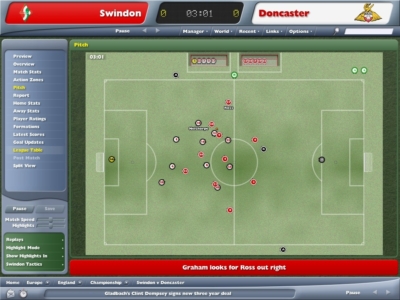
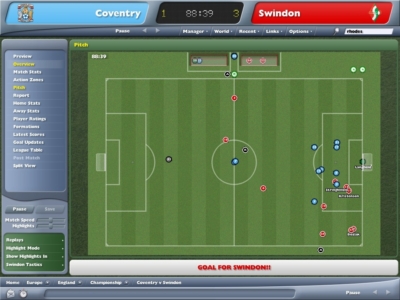
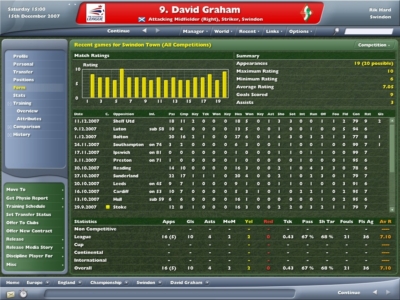
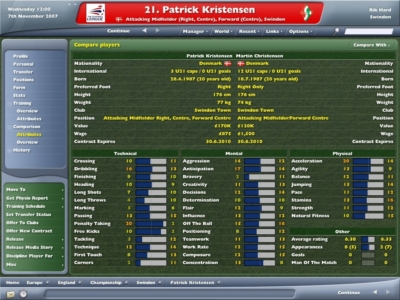
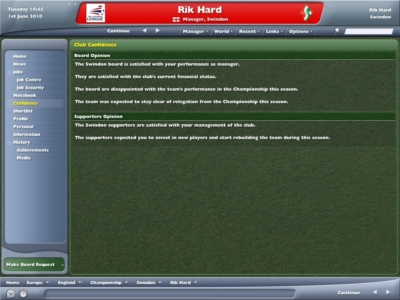

 Posts
Posts